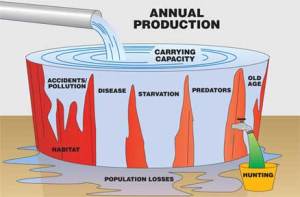For years hunters have battled the stigma that we are a group of people that have no remorse or second thoughts on what we do to the environment. People tend to focus on the negative side of the sport. Hunters are, in fact, the biggest group of conservations. Everyday hunters around the world are taking steps to ensure that wildlife habitats are sustainable and here for years to come.
Some people seem to think that hunters are motivated by watching an animal suffer. This is far from the truth. We as hunters care about wildlife and their habitats, and hope to keep them around for the use and enjoyment of our future generations.
How We Give Back
Hunters are the largest group of conservations. We give back by far more money than any of the activist groups that are actually trying to get rid of hunting all together. All publicly owned lands are funded by hunting. An 11% excise tax for every dollar spent on license fees, bullets, guns and game tags goes back into the funding of public lands and animal sanctuaries due to the Pittman- Robertson Act. Without the funding from hunters there would not be nearly as many public lands for people to horseback ride, bird watch, hike, or anything else you can do on public lands.
The following numbers are from the article Right to Hunt vs. Animal Rights by Jim Amrhein. The number shows just how much money actually comes from hunters. You can read this article by following this link: http://dailyreckoning.com/right-to-hunt-vs-animal-rights/
• $746 million — Annual amount of money spent by hunters in the United States on licenses and public land access fees alone. Sportsmen’s licensing revenues account for more than half of all funding for state natural resource agencies.
• $300 million — Additional monies contributed to wildlife conservation every year by the more than 10,000 private hunting-advocate organizations, like the National Wild Turkey Federation, Ducks Unlimited, and the Rocky Mountain Elk Foundation.
• $4.2 billion — Amount of money sportsmen have contributed to conservation through a 10% federal excise taxes on firearms, ammunition, and gear since the 1937 Pittman-Robertson Act established the tax. Millions of acres of public-use land has been purchased, preserved, and maintained with this money.
Hunting growing sport. And the fact that it is growing means more money spent on hunting. This graph from the New York Times shows the increase in revenue from the 11% excise tax from 1998 to 2009.
Maintaining the habitat
Each area of land has what is called a carrying capacity. Carrying capacity is the number of animals that a habitat can support. Hunting plays a vital role in habitat management. If more animals are in an area of land than can be supported it can actually lead to a huge loss in the number of animals in that area of land.
Fish and Game departments regulate the number of animals that are in an area. They also decide the number of tags that are dealt out in a given hunting season. Through hunting, the carrying capacity can be maintained to a number that a given habitat can sustain.
Another side effect of an excess capacity of animals is that the resources animals use, such as vegetation, would be used up faster than can be replenished. This will eventually lead to widespread starvation and will affect the whole food chain. If the herbivores starve out, then the carnivores that prey on them will also starve.
The image below, from the Arizona Game and Fish hunter safety program, is an example for how hunting maintains the carrying capacities. You can see that hunting is an outlet for the excess animals of a habitat. If those excess animals didn’t go because of hunting they will die anyways through things such as starvation and old age.
What if hunting were outlawed?
I recognize activist’s worries about the effects hunting. But who would pay for public lands and the conservation of wildlife habitats if it weren’t for hunters? In fact, the amount of money hunter give back to wildlife dwarfs what activist groups give back. There simply would not be enough funds to support the lands. And in turn, there would be much fewer public lands, or they might disappear all together.
If hunting were outlawed, habitats would not be able support the excess number of animals. Starvation and disease in wildlife habitats would increase immensely. Habitats could not support the number of animals that live there.
Hunting is a vital aspect to our ecosystems. Not only for maintaining the carrying capacities, but also for the shear amount of money that hunting gives back to keep our wildlife abundant and here for years to come.
